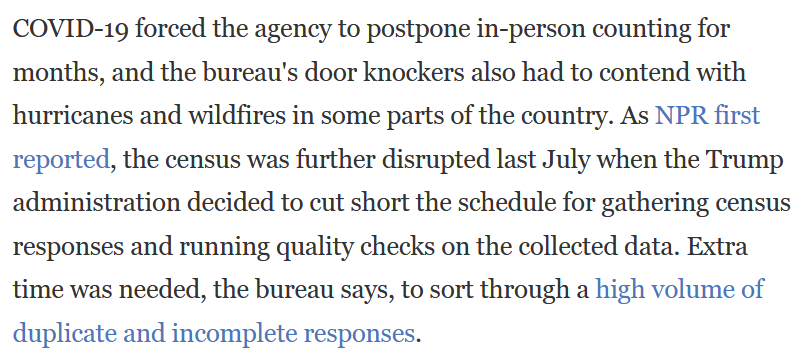
One takeaway from the new U.S. census data: people's racial identities often can't fit neatly into check boxes. @connjie and Ruth Talbot of @nprviz made 2 charts to illustrate why.
npr.org/2021/08/13/101…
npr.org/2021/08/13/101…
@connjie @nprviz 2. Depending on how you slice the 2020 census data, you can get different snapshots of the racial demographics of the United States.
Breakdowns of the racial/ethnic makeup of the U.S. often don't reflect the multiracial population, which has grown by 276% since the 2010 census.
Breakdowns of the racial/ethnic makeup of the U.S. often don't reflect the multiracial population, which has grown by 276% since the 2010 census.
@connjie @nprviz 3. Since 2000, participants have been able to check off more than one box when answering the census race question.
But breakdowns of the US racial/ethnic makeup often focus on racial groups made up of people who marked only one box w multiracial people sometimes lumped together.
But breakdowns of the US racial/ethnic makeup often focus on racial groups made up of people who marked only one box w multiracial people sometimes lumped together.
@connjie @nprviz 4. Here's one possible way of showing the U.S. racial/ethnic makeup with a catch-all group for multiracial people via @connjie and Ruth Talbot of @nprviz (more details on this analysis here: npr.org/2021/08/13/101…) 

@connjie @nprviz 5. And here's another way of showing the U.S. racial/ethnic makeup that distributes people who identified with two or more racial categories across the groups via @connjie and Ruth Talbot of @nprviz (more details on this analysis here: npr.org/2021/08/13/101…) 

@connjie @nprviz 6. And there are other ways to slice the new census data on race/ethnicity, including incorporating people who identify as Hispanic or Latino — and who, according to federal standards, can be of any race — into the different racial groups.
@connjie @nprviz 7. To make matters more complicated, research by the Census Bureau has shown that how some people self-report their racial and ethnic identity can change from census to census:
read.dukeupress.edu/demography/art…
read.dukeupress.edu/demography/art…
@connjie @nprviz 8. Any analysis of the new census data represents a different way of understanding race and ethnicity in the U.S., where count after count people have made clear that their identities often cannot fit neatly into check boxes on census forms.
@connjie @nprviz 9. So be sure to read tweets and headlines about the new census data with a critical eye because race/ethnicity is complicated and always changing.
https://twitter.com/hansilowang/status/1426196856477032451
• • •
Missing some Tweet in this thread? You can try to
force a refresh








